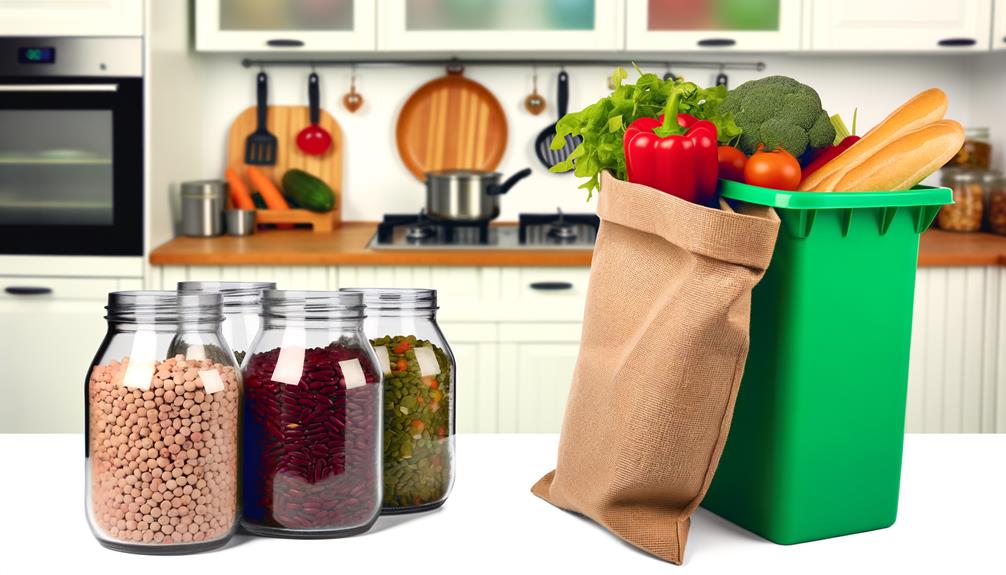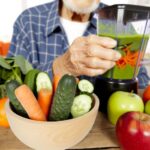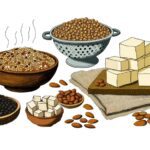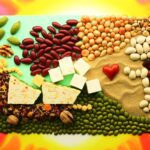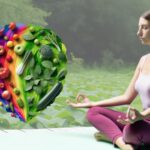You might think that maintaining a vegan diet is complicated or limiting, but it doesn’t have to be. In fact, with the right approach, you can enjoy a rich variety of foods while also supporting sustainable eating practices. Let’s talk about three essential tips that’ll help you navigate your vegan journey more easily: focusing on a rainbow of vegetables, weaving in diverse plant-based proteins, and ensuring you’re getting key nutrients such as Vitamin B12 and Omega-3 fatty acids. The beauty of these tips is that they don’t just apply to one culture or region, they’re global and can be adapted to fit any lifestyle or preference. So, are you ready to unlock the secrets of sustainable vegan eating?
Key Takeaways
- Incorporate a variety of plant-based proteins like tofu, tempeh, lentils, and nuts for a balanced and sustainable vegan diet.
- Choose whole grains like quinoa and brown rice over refined grains for added nutrients and fiber.
- Ensure adequate intake of essential vitamins and minerals, such as vitamin B12 and vitamin D, through fortified foods or supplements.
- Include omega-3 rich foods, such as flaxseeds, walnuts, and algae-based supplements, for optimal brain, eye, and heart health in a vegan diet.
Understanding Vegan and Sustainable Food
When embarking on a vegan and sustainable lifestyle, it’s vital to incorporate a variety of plant-based proteins like tofu, tempeh, lentils, and nuts to ensure a balanced diet. These vegan protein sources not only help you feel full but also provide essential nutrients that are key to healthy eating.
Choosing whole grains like quinoa and brown rice over refined grains adds more nutrients and fiber to your plant-based diet. This simple switch can make your meals more satisfying and help support your sustainable lifestyle.
Remember, not all vegan foods are created equal. Some can still be processed and high in saturated fats. So, it’s essential to opt for whole, nutritious foods as much as possible. Your diet should burst with a variety of fruits and vegetables, whole grains, and plant-based proteins.
Lastly, don’t forget to ensure adequate vitamin B12 intake, which is essential for your health and often lacking in vegan diets. You can get this through fortified foods or supplements.
Switching to Plant-Based Proteins
As you venture into a vegan lifestyle, it’s important to understand how to effectively switch to plant-based proteins such as tofu, tempeh, lentils, and various nuts and seeds. You’re not just promoting sustainable vegan eating; you’re also contributing to a healthier planet.
Here are four tips to help you transition:
- Start by exploring a variety of vegan foods, from tofu and tempeh to lentils, beans, and chickpeas. These plant sources are protein-rich and can be easily incorporated into your meals.
- Don’t overlook the power of nuts and seeds. Almonds, sunflower seeds, and more are not only tasty, they’re packed with protein.
- Diversity is key in a vegan diet. Experiment with a range of plant-based proteins to find what suits your taste and nutritional needs.
- Finally, boost your protein intake with whole grains. Quinoa, for instance, offers 8 grams of protein per cup.
Embracing a healthy vegan diet can be an exciting journey. It’s not just about switching to plant-based proteins, it’s about adopting a lifestyle that’s compassionate towards other beings and our environment. So, dig into that plant-based food and enjoy the journey!
Importance of Vitamin and Mineral Intake
Transitioning to a vegan diet also means paying close attention to your vitamin and mineral intake, as they’re crucial for your overall well-being and optimal bodily functions. When following a vegan diet, it’s essential that you’re aware of the nutrients you need to maintain healthy bones, strong immunity, and vibrant energy levels.
One of the essential tips for eating in a way that nourishes your body is to consume a variety of foods. Eating a varied diet that includes a rainbow of fruits, vegetables, whole grains, and plant-based proteins ensures you’re getting a broad spectrum of vitamins and minerals.
However, there are certain nutrients, such as vitamin B12 and vitamin D, that may be harder to get from a vegan diet alone. That’s where fortified foods and supplements can come in handy. Foods fortified with vitamin B12 and D, as well as calcium and iodine, can help to fill in any nutritional gaps.
For personalized guidance, consider consulting with a registered dietitian. They can provide tailored advice to make sure you’re meeting your nutritional needs while honoring your commitment to a vegan lifestyle. Remember, it’s about balance, diversity, and mindfulness in your food choices.
The Role of Omega-3s in Vegan Diets
Diving into the world of omega-3 fatty acids, it’s crucial for you to understand their significant role in a vegan diet, especially considering their importance for eye, brain, and heart health. These essential nutrients may not always be abundant in vegan diets, and knowing how to incorporate them into your sustainable vegan eating lifestyle is key.
- Sources of Omega-3s: In a traditional diet, omega-3 fatty acids are often derived from fatty fish. However, for a vegetarian diet, the primary type of omega-3 is ALA, found in flaxseeds, walnuts, canola oil, and soy.
- Vegan Products: Vegan products made from algae are a rich source of DHA, a type of omega-3 that is crucial for brain health.
- Dietary Intake: Aim to include a variety of these foods in your meals to ensure a sufficient intake of these essential nutrients.
- Supplements: If you’re finding it hard to get enough omega-3s from your diet, you might want to consider taking a supplement made from algae.
Achieving Balance in Vegan Eating
While ensuring you’re getting enough omega-3s in your vegan diet is crucial, it’s equally important to achieve balance by incorporating a variety of other essential nutrients into your meals. Achieving balance in vegan eating is more than just a diet choice; it’s a commitment to your overall health.
Here’s a quick guide to help you achieve that balance:
| Nutrient | Plant-Based Sources |
|---|---|
| Protein | Tofu, tempeh, lentils, nuts |
| Iron & B Vitamins | Brown rice, quinoa |
| Omega-3s | Flaxseed, walnuts, algae supplements |
Remember, not all vegan foods are created equal. Prioritize whole, nutritious foods over processed ones. And don’t shy away from nutritional yeast; it’s a great source of B vitamins!
The health benefits of a balanced vegan diet extend beyond the body to the planet. By choosing plant-based proteins, whole grains, and a rainbow of vegetables, you’re not only nourishing yourself, but also contributing to a more sustainable future. So, take the time to learn about your foods, explore diverse sources, and enjoy the journey towards healthy, compassionate, and balanced vegan eating.
Frequently Asked Questions
What Are 3 Specific Nutritional Requirements That Need to Be Considered With a Vegan Diet?
You’ve to consider protein sources, iron intake, and B12 supplementation when planning a vegan diet. Include flaxseed for Omega-3 fatty acids, and fortified foods for calcium needs. Don’t neglect regular B12 level checks.
What Are the Three Pillars of Veganism?
You’ve asked about the three pillars of veganism. They’re ethical veganism, protecting animal rights, environmental sustainability to reduce environmental impact, and personal health, ensuring you’re consuming enough plant-based proteins for a balanced diet.
How Is a Vegan Diet More Sustainable?
You’re reducing your carbon footprint with vegan agriculture. Plus, plant-based eating impacts the environment less. You’re lowering emissions, sourcing food sustainably, using less water, preventing deforestation, and reducing waste. Veganism certainly tops carnivorous diets in sustainability.
Which 3 Nutrients Are Most Likely to Be Lacking in a Vegan Diet?
You’re likely to lack Omega-3 fatty acids, calcium, and iron in a vegan diet. Increase your intake of fortified foods, plant milks, and leafy greens to counteract this and maintain a healthy, balanced diet.
